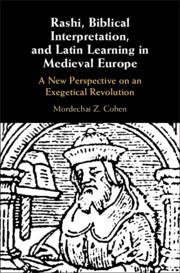 Rashi, Biblical Interpretation, and Latin Learning in Medieval Europe
Rashi, Biblical Interpretation, and Latin Learning in Medieval Europe Book contents
- Rashi, Biblical Interpretation, and Latin Learning in Medieval Europe
- Rashi, Biblical Interpretation, and Latin Learning in Medieval Europe
- Copyright page
- Dedication
- Contents
- Acknowledgments
- Abbreviations
- Introduction
- 1 A New Program of Peshat (“Plain Sense” Exegesis)
- 2 “Settling” the Words of Scripture Using Midrash
- 3 St. Bruno on Psalms: Precedent for Rashi?
- 4 Comparison to the Andalusian Exegetical School
- 5 Comparison to the Byzantine Exegetical School
- 6 Rashi’s Literary Sensibilities and Latin Grammatica
- 7 Rashi’s Notion of “the Poet” (ha-Meshorer) in the Latin Context
- 8 Joseph Qara and Rashbam: Peshat Legacy in Northern France
- 9 Literary Sensibilities of Peshat within a Latin Context
- Bibliography
- General Index
- Index of Scriptural References
- Index of Rabbinic Sources
5 - Comparison to the Byzantine Exegetical School
Published online by Cambridge University Press: 15 April 2021
- Rashi, Biblical Interpretation, and Latin Learning in Medieval Europe
- Rashi, Biblical Interpretation, and Latin Learning in Medieval Europe
- Copyright page
- Dedication
- Contents
- Acknowledgments
- Abbreviations
- Introduction
- 1 A New Program of Peshat (“Plain Sense” Exegesis)
- 2 “Settling” the Words of Scripture Using Midrash
- 3 St. Bruno on Psalms: Precedent for Rashi?
- 4 Comparison to the Andalusian Exegetical School
- 5 Comparison to the Byzantine Exegetical School
- 6 Rashi’s Literary Sensibilities and Latin Grammatica
- 7 Rashi’s Notion of “the Poet” (ha-Meshorer) in the Latin Context
- 8 Joseph Qara and Rashbam: Peshat Legacy in Northern France
- 9 Literary Sensibilities of Peshat within a Latin Context
- Bibliography
- General Index
- Index of Scriptural References
- Index of Rabbinic Sources
Summary
Until almost the very end of the twentieth century, it was assumed that Rashi was the first Rabbanite Jewish interpreter in Christian lands to have composed Bible commentaries that depart from midrashic interpretation and apply a philological-contextual mode of exegesis to arrive at what Rashi termed peshuto shel miqra. This assumption was proven wrong with the publication by Nicholas de Lange in 1996 of a commentary by a certain Reuel on Ezekiel and the Minor Prophets found in the Cairo Genizah that is believed to have been completed by the year 1000 in Asia Minor, perhaps in Byzantium itself. Written in Hebrew with occasional Greek glosses, the commentary manifests a remarkably developed contextual-philological mode of interpretation independent of midrashic exegesis. We had long been aware of a Karaite exegetical school in Byzantium, which has its roots in the tenth-century project of Tobiah ben Moses to translate into Hebrew important Karaite exegetical works of the Jerusalem school earlier in the tenth century, which were penned in Arabic. But linguistic and stylistic analysis of Reuel’s writing indicates that he was a Rabbanite and not a Karaite. On the other hand, the Byzantine commentary on 1 Kings published by de Lange has been demonstrated by Richard Steiner to be Karaite, perhaps penned by Tobiah ben Moses; and Steiner also considers it likely that the highly fragmentary glosses on Genesis and Joshua published by de Lange are also the remnant of a Karaite commentary.
- Type
- Chapter
- Information
- Rashi, Biblical Interpretation, and Latin Learning in Medieval EuropeA New Perspective on an Exegetical Revolution, pp. 134 - 163Publisher: Cambridge University PressPrint publication year: 2021


